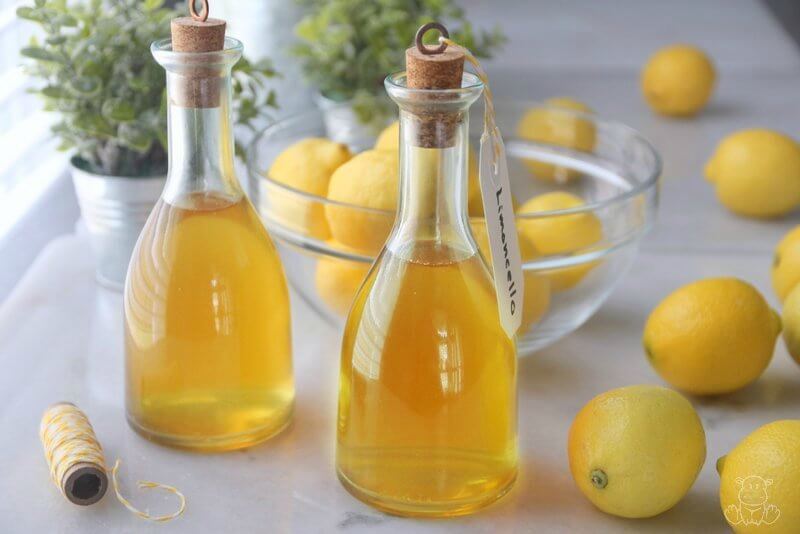
Homemade lemon extract is good for so much more than just adding a pop of flavor to poppyseed muffins or lemon bread. I always set some aside for making this lovely limoncello recipe, which combines lemon zest infused extract with naturally sweetened simple syrup.
Smooth and refreshing, limoncello is a traditional Italian digestif, or after dinner drink that supports digestion. Its lemony tartness is balanced with just the right amount of sweetness, and a little goes a long way.
“Nobody can be sure where, or when, limoncello was invented. Like other liqueurs, it’s likely that it was first concocted by convents or monasteries. And both Campania (particularly the Amalfi coast, Sorrento and Capri), and Liguria (home of the Cinque Terre), claim it as their own.” (1)
What are the benefits of limoncello?
Monasteries and convents were the medicinal dispensaries of the middle ages, so it’s no surprise that limoncello likely originated there. (2) It’s one of many bitter preparations that have a long history of therapeutic use for:
- Promoting strong digestion when taken before a meal. Technically that would make it an aspiritif (before dinner drink) on that occasion.
- Easing indigestion and feelings of excess fullness after a meal
Overall wellness. Italians swear by its health supporting benefits, and current clinical research supports the use of bitter compounds for optimizing digestion and liver function.
“Our current understanding is that, along with supporting healthy digestion, bitters also enhance the liver’s ability to flush inflammatory compounds and irritating substances from our bodies.” (3)
Why make limoncello at home?
Although you can find limoncello in restaurants, it often contains ingredients like FD&C Yellow No.5 and corn syrup. To get the benefits that Italians have sworn by for as long as anyone can remember, homemade limoncello is the way to go.
It’s usually made by infusing grain alcohol with lemon peels – preferably from organic lemons – then combining the resulting lemon vodka with a simple syrup. Grain alcohol is very high in alcohol content. The most common one, Everclear, is usually about 151 proof. I don’t use anything near that high of an alcohol content – mine is usually with 80 proof vodka derived from potatoes and it works just fine.
Also, although the organic cane sugar in my pantry is usually reserved for making sugar cookie body scrub, I’ve tested this recipe with other sweeteners and didn’t love the results. For that reason, I go with tradition and use cane sugar.
What kind of lemons should I use?
I’ve always used plain lemons in this limoncello recipe, but Meyer lemons are on my list to try next. Since they’re sweeter than regular lemons, I’ll probably use less simple syrup with them. If you’ve ever made limoncello with them and have a tip for me, please share it in the comments below!
One final note before we dive in: This recipe uses my homemade lemon extract. If you haven’t made a batch yet, grab your vegetable peeler, organic lemons, a glass jar and some 80 proof vodka, then head over to this post for my easy method.
Limoncello Recipe
Ingredients
- 3 cups lemon extract
- 1 cup organic cane sugar
- 1 cup water
Instructions
- Add water and sugar to a small saucepan and place it over medium heat. When the water starts to warm up, stir until the sugar is completely dissolved.
- Remove the saucepan from heat and allow it to cool completely.
- Pour the lemon extract and simple syrup into a glass mixing bowl and stir to combine. Transfer your homemade limoncello into clean jars or bottles. Serve chilled.
- To store: Keep in the fridge for up to a month or in the freezer for a year.
Nutrition
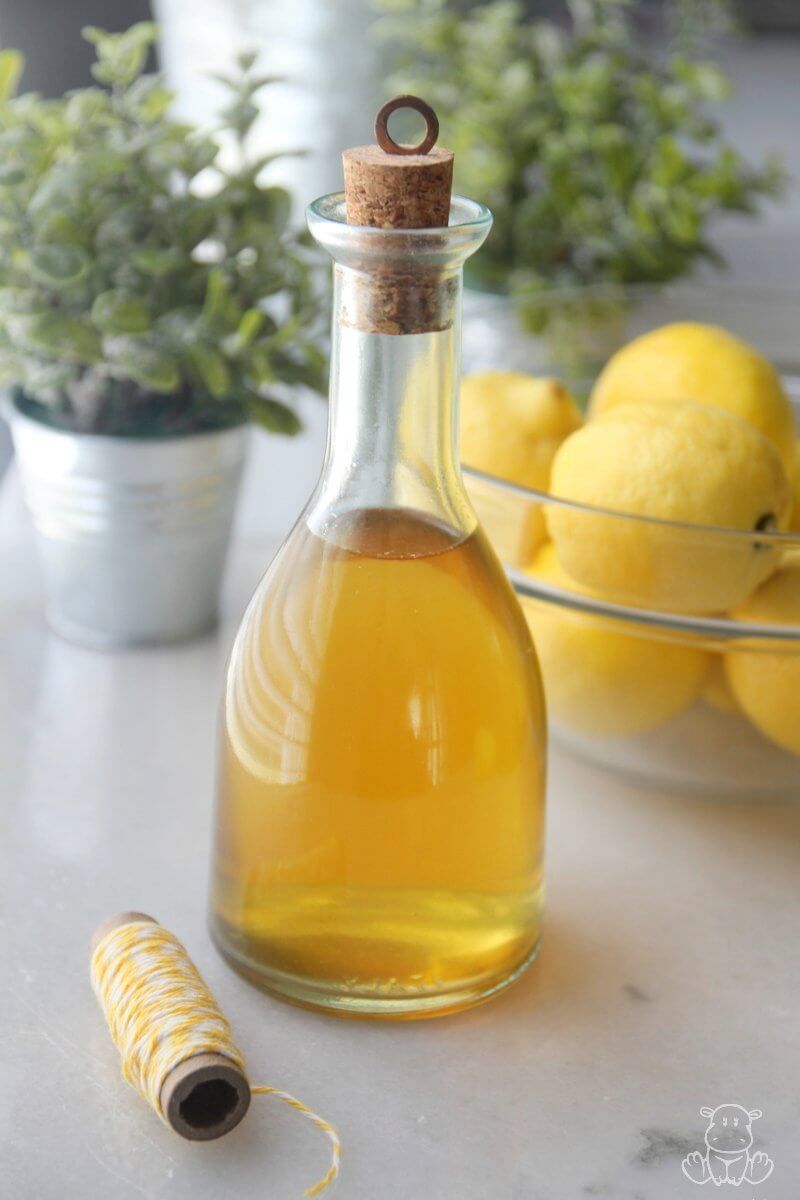
Questions about this limoncello recipe? Let me know in the comments and I’ll see if I can help.
Article sources:
1. Walks of Italy. Limoncello, Italy’s Famous Lemon Liqueur: When And Where To Try It. https://www.walksofitaly.com/blog/food-and-wine/limoncello-lemon-liqueur-amalfi-coast-cinque-terre
2. Suppan, Leo. The monastic dispensaries of the middle ages. Retrieved from https://onlinelibrary.wiley.com/doi/pdf/10.1002/jps.3080040338
3. King, Jovial & Mace, Guido. DIY Bitters: Reviving The Forgotton Flavor – A Guide to Making Your Own Bitters for Bartenders, Cocktail Enthusiasts, Herbalists and More

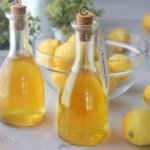
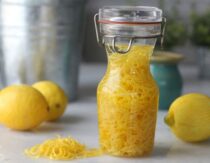
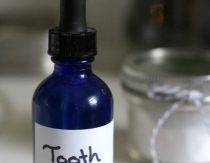


Ok boozy question! Do you have add additional vodka or the lemon extract has enough? Also- do you filter out the lemon peels or leave them in when its all mixed up? I am really excited to give this recipe a try!!
No additional vodka is needed. Yes, the lemon peels are strained out before blending the limoncello.
Hi..love this apperitive.can you tell me what kind of vodka I have to use in this recipe pls? Thanks.
She plainly put that information into the article, go back and read it.
Thanks for this recipe. In the Nutrition facts, what amount gives these percentages?
Damn, can you not read? It states that this recipe makes 5 servings of 1 cup each.
2 questions:
What vodka is potato based?
Where do I find the bottles with the cork tops as pictured in your post?
Thank you!
If you google it you will get some names but my favorite is Chopin, though its a top shelf brand so more expensive then most vodkas.
Vodka is not in the list of ingredients. How much vodka should we use in this recipe?
I let the lemon peel sit in vodka for 40 days in a dark corner in the kitchen. Then strain and throw the peels and add the simple syrup. Then bottle it. Before using put it in the freezer for couple of hrs(alcohol doesn’t freeze). Rim the shot glass with sugar and lemon zest and serve chilled.
Do I have to use lemon extract or can I use lemon juice?
Does the article say lemon juice or does it say lemon extract? Since lemon juice and lemon extract are 2 completely different things, the results would also be 2 completely different things.
So, how do you take it? Do you take it regularly? Or only when you have a heavy meal?
Are the nutrition facts for the entire recipe made with these measurements?
Hi, so this is the syrup part of Limoncello… what is the ratio to make the drink? From comments read, it sounds like potato vodka is preferred, but how much vodka?
What makes you think that the author or someone else should take the time to come the the comment section and retype the info that is already in the article and give you personalize instructions? The answers to all your questions are in the article!
Happy New Year Heather!
Can honey be used in place of the simple syrup? We have refined sugar allergies in the family.
Thanks so much!
Meyer lemon peel does not make good Limocello. Meyer is a cross between oranges and lemons. It comes out bitter. Only use true lemon peels, not the hybrids. My cousin has been makeing Lemoncello for years and had to throw out a batch when he used the Meyer lemon peel. What a waste!
Where did you get the glass bottles in the picture?
I have used Meyer lemons for some things, but I never like the results. The Meyer lemons have very little oil in their peel, and not as tasty as regular lemons. I suppose there are some good recipes for using Meyer lemons, but I haven’t personally run across a recipe that tastes better with them. Use regular lemons!
Thanks for this confirmation. We have a Meyer lemon tree, and I tried it with traditional lemon bars that are so tasty. Meyer lemon doesn’t give the same flavor burst.